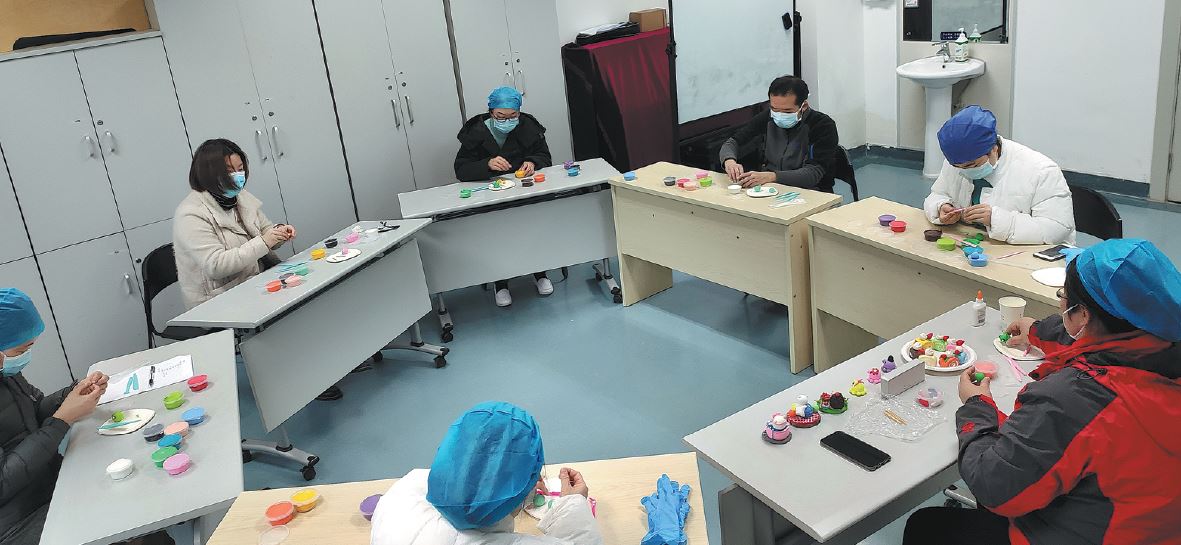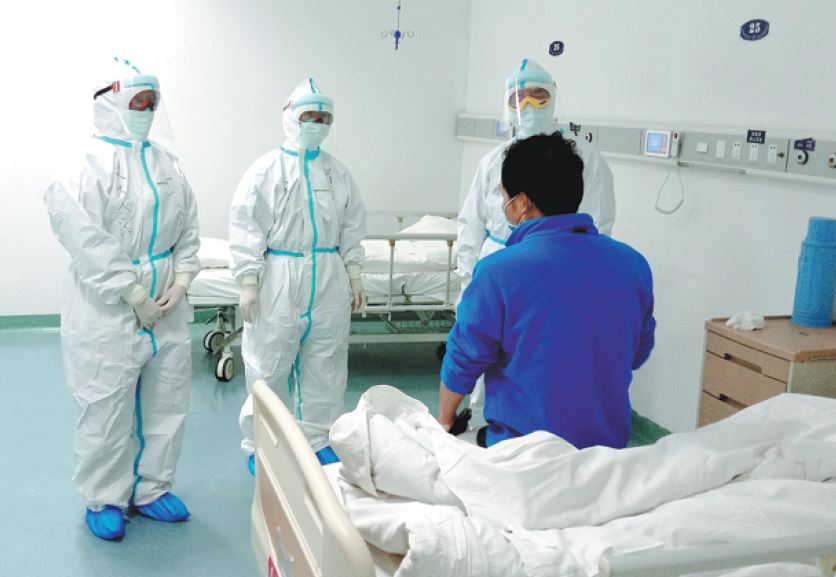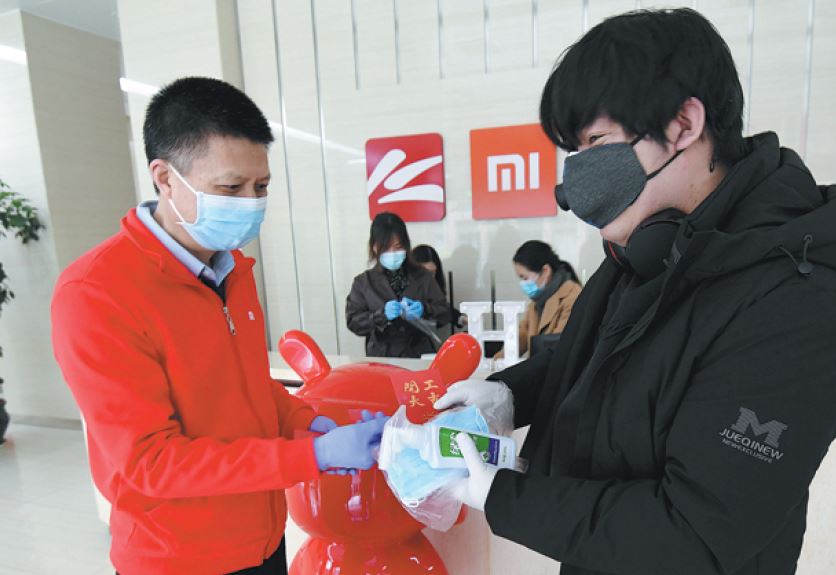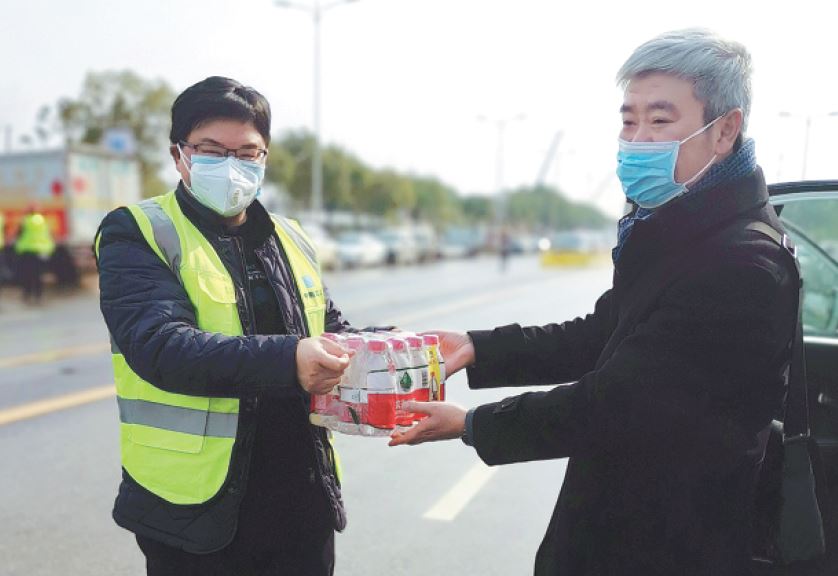国际新闻界本篇文章12121字,读完约30分钟

As things return to normal in Wuhan, Hubei province, three members of the Hubei Provincial Committee of the CPPCC reflect on the roles they played to help keep the city running through some of its darkest days. Zhao Yimeng reports.
Liu Zhongchun: member of the Hubei Provincial Committee of the Chinese People's Political Consultative Conference and director of the Department of Psychiatry at Renmin Hospital of Wuhan University
In a news release on May 13, Antonio Guterres, UN secretary-general, called for more attention to be paid to the mental health issues resulting from the COVID-19 pandemic.
"The COVID-19 virus is not only attacking our physical health, it is also increasing psychological suffering," he said.
Some prevention and control measures are still in place in Wuhan, Hubei province-one of the places hardest hit-as life returns to normal, and mental health experts are working on the front line to help people with depression and anxiety.
Liu Zhongchun, a 47-year-old psychiatrist at Renmin Hospital of Wuhan University, is head of a psychological crisis intervention panel that was established in early February.
Composed of 26 experts from hospitals, universities, mental health associations and voluntary organizations, the panel provides psychological assistance at hospitals designated to treat coronavirus patients, Fangcang-or makeshift-hospitals, quarantine points and recovery centers in the city.
During the initial phase of the epidemic, locals experienced mental distress as a result of the lockdown and fear of the virus.
In response, Liu and his team visited three Fangcang hospitals to conduct research on the mental health of medical professionals and COVID-19 patients.
"We looked for people who needed psychological assistance, then offered our services. It was quite different from providing regular counseling before the epidemic," Liu said.
In the past, people made appointments with psychiatrists and paid for counseling sessions, but it was often hard to register with experts because of the overwhelming demand, according to Liu.
"Some members of our team were not used to actively seeking patients. They didn't know how to find people in need of psychological counseling," he said.
The team introduced mental health guidance by providing information for potential patients and putting up posters at hospitals, while phone hotlines and online platforms offered access to professional counseling.
The team also trained medical workers in psychological skills.

"They could use the skills to solve their own mental problems and boost their psychological strength. Moreover, the medical workers, especially nurses, could impart the knowledge to patients while providing regular medical services," Liu said.
He added that some of the methods used to improve psychological support for patients included daily routines, health education and music broadcasts.
The medical workers could also alleviate their own anxiety by taking part in relaxation training and other mental health services at special facilities in the hospitals.
Based on a survey conducted at several Fangcang hospitals, the team launched a psychological assistance plan that was implemented at 13 makeshift clinics and 43 designated hospitals.
During their early days in Fangcang hospitals, some patients experienced negative emotions because they were unable to sleep in the large open space that housed hundreds of patients. "We encouraged them to take part in various activities," Liu said.
As the living conditions and meals gradually improved, the patients became more satisfied with their lives. To protect their families, some were even unwilling to go home, he added.
When the epidemic had generally been brought under control and the citywide lockdown was lifted, many medical assistance teams, including mental health experts, left Wuhan.
However, as more problems have appeared in the aftermath, mental health services are still necessary at recovery centers in hospitals and residential communities to treat post-traumatic stress disorder, Liu said.
When they were finally relieved of the intense burden of work, some medical professionals began to doubt the value of their efforts, especially given the high number of fatalities, which resulted in professional burnout.
However, they rarely expressed those thoughts because medical professionals tend to hide their emotions.
"We must actively teach them to understand their own feelings. We have asked them to separate work from daily life, spend more time with their families and try to forget the bad memories," Liu said.
Meanwhile, some patients who had been cured or were asymptomatic were concerned about discrimination when they returned to their neighborhoods.
"We told them 'People are afraid of the virus, not of you'. At the same time, we strengthened science education in communities," Liu said.

Liu Guojun: member of the Hubei Provincial Committee of the CPPCC, and CEO of Xiaomi's headquarters in Wuhan
On Jan 20, Liu Guojun held an emergency meeting at Xiaomi's offices in Wuhan to announce that the company would start its Spring Festival holiday early-five days before Lunar New Year-because of the "unknown pneumonia" spreading across the city.
"We may have been the first company in Wuhan to voluntarily start the holiday early because of the virus," he said.
Having lived through the 2003 outbreak of severe acute respiratory syndrome in Guangzhou, Guangdong province, Liu paid close attention when the new illness emerged in late December, and he began handing out face masks and flu medication to employees.
Despite the early start to the holiday, some employees wanted to stay in the company compound for the sake of convenience. "We encouraged them to leave, saying we had to cut off the water and electricity to ensure their safety," Liu said.
On Jan 23, the day Wuhan was locked down, he began checking warehouses belonging to Xiaomiyoupin, the company's e-commerce platform, looking for protective materials such as face masks, medical alcohol and thermometers.
"The problem was that some drivers for logistics companies refused to enter Wuhan for fear of becoming trapped in the city by the lockdown before Spring Festival," Liu said.
Wuhan suspended local transportation services and private vehicles were banned from entering or exiting the city.
While drivers transporting medical supplies were given the green light to enter, they were still concerned about getting permission to leave the city with an empty car.
The first batch of medical supplies transported from four warehouses nationwide was stored in Xiantao, a neighboring city, on Jan 25. Later, the goods were distributed to the Wuhan branch of the Red Cross Society and makeshift hospitals, according to Liu.
The company has applied high-tech measures to the prevention and control of the epidemic, he said.
The Artificial Intelligence team has cooperated with other technology groups to develop an infrared thermometer, while medical and epidemic-related information has been added to the database of its digital speaker products.
"In mid-March, 94 percent of our employees started working remotely. We organized online activities to ease their anxiety," Liu said, adding that the company delivered more than 100 laptops to employees who usually worked on desktop computers in its Wuhan offices.
Nearly 200 employees resumed work at the headquarters on March 30 after testing negative for the coronavirus. "So far, none of the 2,000 staff members has become infected," he said, speaking two weeks ago.
Many companies were forced to lose large numbers of employees or reduce salaries as business stalled.
However, in a May 9 interview with Leinews, an online media outlet, Lei Jun, founder and CEO of Xiaomi, said the Wuhan headquarters would recruit 1,000 workers this year to solve the problem of local youth unemployment and boost production.
Liu said, "If two job applicants have the same qualifications and qualities, we always give preference to the children and relatives of medical workers."
He added that the company recently employed eight research and development personnel who are the children of medics.
"We maintained full salaries and didn't cut any jobs during the epidemic," he said.
Last month, Xiaomiyoupin opened a special section to sell agricultural produce and specialties from Hubei, including the well-known local crawfish, in an effort to help drive consumption and aid the city's economic recovery.

Xue Wei, member of the Hubei Provincial Committee of the CPPCC and president of the Hubei Zhongxin Accounting Firm
Four months after the construction of the Huoshenshan Hospital-a makeshift facility built to treat COVID-19 patients in Wuhan-Xue Wei and his colleagues were still working on settling the accounts for the project.
"The task is expected to be completed soon. The duration of the accounting work is much shorter than for most of the projects we worked on before," Xue said.
His firm was mainly responsible for drawing up a budget and calculating the cost of the project with representatives of the construction companies involved.
"When we were called upon to form an accounts team for the project, many of our employees had already returned to their homes outside Wuhan for Spring Festival," Xue said.
In response, he mobilized eight engineers, who had arrived at the construction site on Jan 25, to keep a record of the project.
Later in the account settlement process, 20 more employees joined the group to assist with the heavy workload, he added.
The rushed preparation ahead of the project resulted in a heavier task for the settlement process, which involves checking on thousands of manual workers and huge sums of money, according to Xue.
"When the project began, the focus was to produce high-quality work and ensure construction finished on schedule. The contract items and cost accumulation were not perfect initially," he said, adding that the cooperation of different units in the final stages will guarantee an efficient settlement.
Regular accounting projects usually last two to three years, because the preparatory work-including evaluating feasibility, choosing the location, drawing up a budget and process design-usually takes six months to a year, according to Xue.
However, the preparation time for the Huoshenshan project was 24 hours, he said, noting that much of the work was undertaken in tandem with construction work.
The tough assignment, starting on the first day of the Lunar New Year, was not something the 50-year-old had experienced before.
"But I was encouraged by the environment, where people from all walks of life were fighting on the front line against the epidemic," he said.
"It was really meaningful to accomplish such an urgent task with the cooperation of different parties in the unusual price market that existed at the time," he said.
He said the situation was complicated by the lockdown and the Spring Festival holiday.
"When the people of Wuhan were isolated at home, we had the chance to do something. The city had to keep running," he said.
Xue said he has always been interested in military history, so he was never afraid of the dangerous environment he had entered. Instead, he was more concerned about the safety of his team members and his family, along with the smooth development of the project.
"Thousands of people worked on the Huoshenshan construction site, so I had no excuse to be afraid," he said.
标题:Advisers recall guiding life during lockdown
地址:http://www.ruanwenj1e.com/article/540.html
上一篇:上一篇:Harley-Davidson宣布全球品牌总裁
下一篇:下一篇:年轻人有态度,国潮手表品牌强势崛起,引领潮酷新风向!
